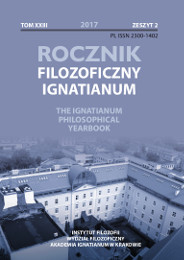Leibnizjański kontekst teorii trzech światów K.R. Poppera
The Leibnizian context for Karl Popper’s theory of three worlds
Author(s): Halina ŚwięczkowskaSubject(s): History of Philosophy, Philosophical Traditions, Special Branches of Philosophy
Published by: Uniwersytet Ignatianum w Krakowie
Keywords: pochodzenie i ewolucja języka; wiedza; trzeci świat Poppera; świat idei Platona; racjonalny obraz świata Leibniza
Summary/Abstract: Leibnizian context of K.R. Popper’s theory of the three worlds Popper’s views on language and its functions, discussed in a book titled Knowledge and the Body-Mind Problem, are integrally linked to his theory of three worlds. I intend to present basic principles of this theory, focusing in particular on Popper’s conceptualization of the so-called third world and a fundamental role of language in the process of the world constituting. In the above-mentioned book, Popper describes his theory of the three worlds from a historical perspective and compares the theory with Plato’s, Bolzano’s and Frege’s ideas. He also mentions Leibniz as one of his predecessors; however, Popper does not undertake any analysis of Leibnizian concept of the world and the language. In this article, it is attempted to juxtapose Popper’s theory with Leibniz’s views, as well as to indicate some similarities and differences between them.
Journal: Rocznik Filozoficzny Ignatianum
- Issue Year: 23/2017
- Issue No: 2
- Page Range: 117-131
- Page Count: 15
- Language: Polish

